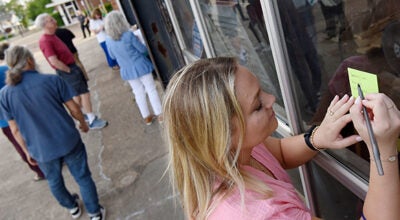Three groups hope to start charter schools in Natchez
Published 12:05 am Sunday, February 9, 2014
NATCHEZ — Members of three groups who filed letters of intent to open charter schools in Natchez say the area is in need of more educational opportunities for students.
Charter schools are public schools run by private groups that agree to meet certain standards in exchange for less regulation.
In 2013, the Mississippi Legislature approved measures allowing for the schools to operate in the state in poor performing districts.
The schools can’t be opened in a district rated A, B or C by the State Department of Education.
The Natchez-Adams School District received an F rating in September.
Thirty groups submitted letters of intent last month in hopes of opening schools throughout the state.
Three of those groups submitted letters to open schools in Natchez.
These are the first time applications for charter schools have been filed in Mississippi.
Mississippi’s Charter School Authorizer Board may approve up to 15 charter school applications per year.
Applications for charter schools are due March 14, and the authorizer board will vote on them in June. State officials said it’s likely the first charter schools could open in fall 2015.
Accelerated Preparatory School of Natchez
Partners of Academics, Leadership and Service (PALS) was organized in 2012 in Gloster following the closure of Gloster Elementary School, which was shuttered by the Amite County School District for financial reasons.
Doris Beasley-Phillips, one of the members of the organization, said the closure left the community without a public school and in need of a change to its educational offerings.
The group purchased the elementary school’s campus in 2012 and decided to create a community complex that could house a high-school recovery program, business incubator, senior citizen center and a charter school.
The Accelerated Preparatory School (APS) of Gloster was proposed and led to a group of executive managers interested in creating similar educational opportunities across the state, Beasley-Phillips said.
“We statistically looked at the counties that were located around the state and decided to focus strictly on the Mississippi Delta,” Beasley-Phillips said. “In the majority of those counties, 91 percent of the children in the Delta are at or below the poverty level.
“We felt like those were the communities that are in need of the most educational change.”
The APS of Natchez would incorporate a STEM, or science, technology, engineering and math, learning model, while also using project-based learning methods to teach the curriculum.
Project-based learning is a student-centered instructional strategy in which students collaboratively answer questions and solve problems and then reflect on their experiences.
The mission of the school, as listed in the group’s letter of intent, is “to be a tool that ignites each scholar’s hidden potential and accelerates it to new levels of cognition in science, technology, engineering and math.”
The school would be open for students in kindergarten through 12th grade and would open in the 2015-2016 school year if approved.
Phoenix Early College Charter School
Phoenix Project Community Development Foundation Inc. was created in part by Natchez native Iretha Beyah, who has advocated for charter schools in the area before, including in Fayette, Waterproof and Ferriday.
The group is seeking to open an early college high school model that would have open enrollment for students in grades ninth through 12th and for ages 14 through 21.
The goal of the school, the group’s letter of intent states, would be for all students to have the dual attainment of a high school diploma plus transferable college credits and/or post-secondary technical certifications.
The school, Beyah said, would partner with Copiah-Lincoln Community College’s Natchez campus to provide those opportunities.
The mission of the school includes ensuring every student achieves 21st century college, technology and career skills while also gaining the character and leadership tools to be a productive member of society.
“We’ve been talking about the possibility of charter schools in Mississippi since 2003 or 2004, when we found that the parents and students of this area were hurting for educational opportunities,” Beyah said. “I love my hometown and I think it’s a great place to grow up, but I want our children to want to stay here, be able to find jobs and help bring more economic opportunities here.”
The school’s curriculum would revolve around project-based learning and character and leadership development, among other instructional methods.
The school would be operated with a contractual agreement with Charter Pros, the consulting and management organization of Robertson Charter School of Decatur, Ill.
The company offers a “cafeteria” of services from which the Phoenix group would choose from, the letter of intent states.
Academy of Arts and Sciences Mississippi
The Academy of Arts and Sciences Mississippi (AASM) would offer an International Baccalaureate program to students in grades kindergarten through 12th in Natchez.
International Baccalaureate is an educational foundation that offers programs for children ages 3 to 19 to help develop the intellectual, personal, emotional and social skills to live and learn and work in a rapidly globalizing world, according to the foundation’s website.
Founded in 1968, the foundation works with 3,717 schools in 147 countries.
Long-time educator Lonnie Yancsurak said the goal of the charter school planned for Natchez would be to create more globally-minded citizens.
“We’re really looking to develop internationally-minded people because if you can get these kids to shift their thinking a little bit and understand that they are a part of this global community, it really makes a difference,” Yancsurak said. “When you show kids that there’s this larger world out there, it makes them want to go explore and have that desire to learn.”
The school’s mission is to “develop leaders passionate about making a positive contribution to their local and global communities.”
The school would offer courses in STEM, world languages, advanced placement and the arts.
The combination would give students, and in particular students in low socio-economic neighborhoods, the best chance to gain acceptance to and excel in excellent higher education institutions, the group’s letter of intent states.





